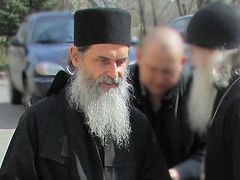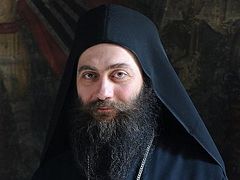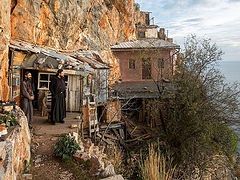 Schema-Hieromonk Ioan (Guțu). Photo: Hariton Lavriotul Schema-Hieromonk Ioan (1906—1996) is one of the most venerated Romanian monks who lived on Holy Mount Athos. At the age of nineteen he arrived there to devote his life to Christ and lived an ascetic life in Romanian sketes for seventy years: first at Lakkoskiti (Lacu), and then at Colciu. He was noted for his perfect humility, simplicity, and the austerity of his monastic life, was a great faster, man of prayer, an ascetic and hermit. He fell asleep in the Lord on December 5, 1996, at the age of ninety.
Schema-Hieromonk Ioan (Guțu). Photo: Hariton Lavriotul Schema-Hieromonk Ioan (1906—1996) is one of the most venerated Romanian monks who lived on Holy Mount Athos. At the age of nineteen he arrived there to devote his life to Christ and lived an ascetic life in Romanian sketes for seventy years: first at Lakkoskiti (Lacu), and then at Colciu. He was noted for his perfect humility, simplicity, and the austerity of his monastic life, was a great faster, man of prayer, an ascetic and hermit. He fell asleep in the Lord on December 5, 1996, at the age of ninety.
This is how Elder Dionisie (Ignat) recounted the life of Abba Ioan:
“He came to Mt. Athos in 1926. His spiritual father was Elder Ilie, but soon all the skete elders died (Ilie (Vulpe), Gherontie, Paisie, and Eftimie), and he remained at Lakkoskiti[1] alone for about twenty years.
“Fr. Ioan and I lived at the kellia [the name for a small skete on Mt. Athos.—Trans.] of Colciu[2] as brothers, and my cell was absolutely identical to his[3]. We would spend all the great and lesser (minor) feasts together. Fr. Ioan (Guțu) was a good monk, very zealous and very strict in monastic life. Other monks tried to join him but they could not take it. He was only a priest, not a father-confessor. And when the last confessor died in the kellia, he no longer served even once, out of humility. He was a good man.”
Elder Ioan was born in 1906 in the village of Popeşti of the Soroca district in Bessarabia [in fact in what is now Moldova.—Trans.]. Being entirely devoted to God, at the age of nineteen he travelled to Mt. Athos where he remained forever. After spending seventy years in spiritual labors he entered the Heavenly Kingdom. Over those years he left Mt. Athos only once because he was forced to do so.
 Schema-Hieromonk Ilie (Vulpe), spiritual father of Schema-Hieromonk Ioan (Guțu) He was in obedience to his father-confessor, Schema-Hieromonk Ilie (Vulpe), and his father, who exhorted him, “Try to die here.” Over the ninety years of his life—from 1906 till 1996—Elder Ioan acquired so much divine grace and humility that he reached the greatest depth of innocence. He was a remarkable faster (he ate only once every other day), a wonderful ascetic (he would sleep at the most three hours at night, while sitting on a bench), and a great man of prayer (he made prostrations even in his old age when his feet bled, and he never took any medicine).
Schema-Hieromonk Ilie (Vulpe), spiritual father of Schema-Hieromonk Ioan (Guțu) He was in obedience to his father-confessor, Schema-Hieromonk Ilie (Vulpe), and his father, who exhorted him, “Try to die here.” Over the ninety years of his life—from 1906 till 1996—Elder Ioan acquired so much divine grace and humility that he reached the greatest depth of innocence. He was a remarkable faster (he ate only once every other day), a wonderful ascetic (he would sleep at the most three hours at night, while sitting on a bench), and a great man of prayer (he made prostrations even in his old age when his feet bled, and he never took any medicine).
He did not speak much, because if someone did not benefit from his silence then it was useless to ask for his advice (and that is true: looking at his face would be enough to learn a lesson of humility!). He always believed, “We need to start with the fear of God and continue with love for Him. Let us add much humility and prayer between these, and we will reach the Heavenly Kingdom.”
For his labors God revealed the day of his departure from this world to him beforehand. So two months before his repose Elder Ioan settled all his affairs, asked for all the brothers’ forgiveness, including the brethren who lived in St. George’s Skete with Elder Dionisie (Ignat ) who gave him Communion, and on December 5 he passed away.
Elder Ilie from Colciu related that one day they had nothing to eat on the feast of St. John the Baptist, their skete’s patronal feast. They repeatedly cast a net but caught nothing. There was the eve of the feast, so the brethren, frustrated, went to Elder Ioan. The elder told them:
“Go to the lake by the coast and fetch that giant fish.”
The fathers were about to argue and say that they had just come from there but showed obedience and held their tongues. And, having approached the coast, they were astonished to see a fish swimming right towards them, which was big enough to last them all two days. They took the fish out of the water with their bare hands and gave praise to God.
 Colciu Skete, the cell of Elder Ioan (Guțu)
Colciu Skete, the cell of Elder Ioan (Guțu)
Shortly before his repose, in November 1996, Elder Ioan met with the young Adrian Lemeni, the future State Secretary for Religious Affairs in Romania[4]. The young man asked him:
“Father, what do you think you have acquired over the seventy years of prayer on Mt. Athos?”
The elder answered him:
“I have acquired boldness towards God.”
Father Augustin, Fr. Ioan’s disciple towards the end of the elder’s life who worked with him in the vegetable garden, once said for a joke:
“Pray to God, o venerable father, since you have obtained His favor, that He can send us a spring closer to our kellia so we no longer have to carry the water from the valley.”
The elder then said nothing, but by the autumn when Fr. Augustin had already forgotten this, a spring of pure water gushed forth just a little higher up from the kellia, only a few yards from the piece of land where they had a vegetable patch. They draw water from it to this day.
Once a Greek novice from Vatopedi Monastery came to listen to Fr. Ioan’s instructions. Having received his blessing, the Greek was going to leave, but the elder said to him at parting in Greek:
“Kalos taxidis, pater Athanasios [meaning: “Welcome, Father Athanasios”.—Auth.].”
And the Greek hadn’t been tonsured a monk yet. But when he wanted to tell the elder about this, Fr. Ioan said:
“This is all not according to your will but according to the will of God.”
Today you still can find Father Athanasios in the community of the same Vatopedi Monastery.
George Crasnean
Source: Sfantul Munte Athos (“Holy Mount Athos”)
One of the miracles that occurred after the elder’s repose
 Archimandrite Porphyrios with the skull of Schema-Hieromonk Ioan (Guțu) An extraordinary miracle occurred to a Romanian priest who visited Holy Mount Athos in 2007. From the bottom of his heart he wished to visit Elder Ioan’s grave. He held this elder in great reverence, knowing that he had reposed eleven years before. In his desire to bow down before the elder, he arrived to his grave in Colciu in broad daylight. He suddenly saw a little old man with a meek serene face standing by the grave. The priest asked the old man:
Archimandrite Porphyrios with the skull of Schema-Hieromonk Ioan (Guțu) An extraordinary miracle occurred to a Romanian priest who visited Holy Mount Athos in 2007. From the bottom of his heart he wished to visit Elder Ioan’s grave. He held this elder in great reverence, knowing that he had reposed eleven years before. In his desire to bow down before the elder, he arrived to his grave in Colciu in broad daylight. He suddenly saw a little old man with a meek serene face standing by the grave. The priest asked the old man:
“Who are you?”
“It is me, Ioan Guțu, to whose grave you have come.”
Dumbfounded, the priest answered him:
“How can it be, Your Reverence, that you are still alive? Everybody says that you died long ago and you are remembered at memorial services.”
“Even if I died, know that I am still alive.”
After this brief conversation our priest asked for the elder’s blessing, kissed his hand and then left, filled with a great spiritual joy he had never experienced before[5].




